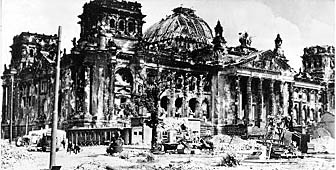
Swiss neutrality strengthened by Cold War

A tranche of Swiss diplomatic documents, covering the three years after the Second World War, has shed light on how Switzerland managed to preserve its neutrality in a world divided by competing ideologies.
The 18th edition of Swiss diplomatic documents, edited and compiled in book form, covers the period from 1949 to 1952, and shows how Switzerland reacted to the new diplomatic challenges of the Cold War.
The project’s research director, Antoine Fleury, told swissinfo that the biggest challenge facing Swiss diplomacy at the time was trying to convince Moscow and Washington that Switzerland was not taking sides.
He says this was not easy given that communist values were diametrically opposed to democratic ones. Swiss diplomacy wanted to maintain a neutral stance towards all nations, regardless of ideology.
“As far as rivalry between the two superpowers – Washington and Moscow – was concerned, Switzerland hoped that it would not lead to a war because that would have forced Swiss diplomacy to make a choice between the two sides. So in a way, the Cold War preserved the possibility for Switzerland to remain neutral.”
But preserving that neutrality was not always easy. At one point, the United States attempted to convince its allies to support a blockade against Russia – a position Switzerland could not support. The US was Switzerland’s most important trading partner at the time, and ties between Washington and Bern became increasingly strained.
“Switzerland with its policy of neutrality could not accept the blockade on communist countries,” Fleury said. “Switzerland played an intermediary role and tried to convince Washington to place fewer restrictions on Switzerland as a result of its continued trade with Russia.”
It was a similar story with China, which underwent a communist revolution in the years following the war.
“Swiss diplomats reacted very quickly to accept and to maintain contact with the Chinese government, whether it was communist or not,” Fleury told swissinfo. “Switzerland was one of the few countries in the Western hemisphere to maintain ties with the country.”
As far as Switzerland’s “neutral” role in the Second World War was concerned, Swiss diplomats were faced with the issue of alleged Jewish slave labour in Swiss-run factories in Nazi Germany and the scandal of Holocaust accounts.
Fleury says that Swiss diplomacy started negotiations with Jewish organisations in Bern and Washington during this time to find a solution to the issue.
Bruno Frick of the Swiss Senate’s foreign politics commission praised the new book saying it was of the utmost historical importance both for politics and the Swiss public.
The book is the latest volume in a series, which deals with Swiss diplomacy since the middle of the 19th century. The first 15 volumes cover the years 1848-1945 and took 21 years to complete.
For the latest edition researchers worked on more than 3,000 documents, 1,000 of which can be viewed on the Internet.
swissinfo with agencies

In compliance with the JTI standards
More: SWI swissinfo.ch certified by the Journalism Trust Initiative





























You can find an overview of ongoing debates with our journalists here . Please join us!
If you want to start a conversation about a topic raised in this article or want to report factual errors, email us at english@swissinfo.ch.